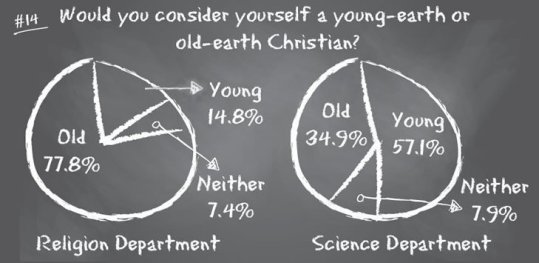I’m Not Surprised, But I’m Not Sure What It Means

One of the many results of a poll taken at 200 conservative Christian colleges and universities. It indicates that the science faculty in those institutions are more likely to be young-earth creationists than their fellow religion faculty. (click for credit)
In 2011, Answers in Genesis published a book entitled Already Compromised. It was based on the results of an interesting poll. The pollsters (America’s Research Group and Britt Beemer) attempted to contact four faculty/staff members (the university president, the academic dean, the head of the science department, and the head of the religion department) at 200 different Christian colleges and universities. Of those potentially 800 people, they ended up being able to interview 312. They asked a wide variety of questions, focusing on how those individuals interpreted different aspects of the Bible. The results are presented in the book, along with ample commentary.
The conclusion of the book is that many Christian colleges and universities have “compromised” their theology, subordinating the teachings of the Bible to the scientific consensus. In other words, they have decided that they must force their interpretation of the Bible to “fit” the scientific consensus, which includes flagellate-to-philosopher evolution and a billions-of-years-old earth.
Now please understand that I do not agree with the conclusion of the book. I don’t think that those who believe the earth is ancient or that God has created through evolution are necessarily “compromising” their theology. Non-literal interpretations of various parts of the book of Genesis can be traced all the way back to (and before) the beginning of Christendom, and there are literal interpretations of Genesis that result in conclusions other than young-earth creationism. Thus, the whole idea that people who disagree with me when it comes to natural history are “compromised” is absurd.
Despite the fact that I disagree with the book’s conclusions, I am interested in the results of its poll, especially the one highlighted in the graphic above. According to the poll’s results on this issue, the heads of the science department in these 200 Christian colleges and universities are nearly four times more likely to be young-earth creationists than the heads of the religion department!
Is that surprising to you? It isn’t surprising to me. In fact, it is consistent with my general experience. Among the brothers and sisters in Christ with whom I am well acquainted, those who are educated in science are more likely to be young-earth creationists, and those who are not educated in science are more likely to be theistic evolutionists. Of course, my general experiences are not representative of Christianity as a whole, so it’s interesting to see the results of this poll.
Of course, this poll isn’t really representative of Christianity as a whole, either. Of those who were interviewed, 223 were from schools that belonged to the Council for Christian Colleges and Universities (CCCU), which tends to attract conservative evangelical institutions. The remaining 89 were from institutions that are associated with a particular denomination. In the end, then, I would say that this poll might be representative of conservative American Christianity, but not Christianity as a whole.
In addition, the sample size is rather small. Assuming the poll’s 312 participants were evenly spread out among the four positions targeted, each pie graph shown above represents results from only 78 people. That produces a statistical error of more than 11%. However, even with an error of 11%, the results are striking. Even if both pie graphs are off by a wide margin, their results still indicate that science faculty at conservative Christian institutions of higher learning are more likely to be young-earth creationists than the corresponding religion faculty.
What can explain these striking results? I think one factor is related to a person’s willingness to question the scientific consensus. Those who are well educated in the sciences understand that the scientific consensus is not always right. As a result, they are probably more willing to question it. Also, scientists have training in analyzing data, so they are more likely to actually look at the evidence presented by those who believe in an ancient earth or flagellate-to-philosopher evolution and examine it critically. Those whose expertise lies in other areas (such as language, history, or theology) are less likely to do such things, so they are more likely to believe the scientific consensus.
I suspect that there are other factors as well, but I am not sure what they are. I would love to conclude that the poll results tell us that young-earth creationism is the more scientifically-correct view when it comes to origins, but they obviously don’t tell us that. Science is not based on consensus. It is based on analyzing the data thoroughly and coming to the most reasonable conclusion you can based on those data. Even if only a tiny minority of scientists at conservative Christian colleges and universities were young-earth creationists, I would still consider it the most scientifically-correct view when it comes to origins, because I think the data speak very clearly on the matter.
I am interested in what you think. Do you have an explanation for why the poll ended up with such striking results?
Jay L. Wile's Blog
- Jay L. Wile's profile
- 31 followers



